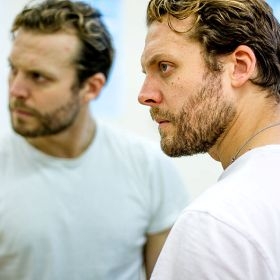A Number (Nuffield Theatre)

© Richard Budd
At its best, the collision of art and science can offer us surprising perspectives on the discoveries and technologies shaping our lives. The prospect of human cloning remains among the most fascinating of scientific developments, provoking heated debates, existential anxiety and countless artistic responses, many of which circle around one troubling question: what makes me who I am?
Caryl Churchill‘s tightly focused play, written over a decade ago, still feels strikingly contemporary in its ethical and emotional interrogation of this subject matter, even if her rehearsal of nature versus nurture debates occasionally lacks in subtlety. In Michael Longhurst‘s production, this forensic investigation of identity, similarity, difference and free will is lifted out of any specific context, allowing it to speak beyond strict temporal limits. Contained within Tom Scutt‘s claustrophobic design, the dislocated characters find themselves in the position of squirming specimens under the microscope, while audience members are cast as part curious scientists, part grubby voyeurs.
On this hemmed in, deliberately spare stage, performers (and real life father and son) John and Lex Shrapnel dynamically circle one another, their quickfire dialogue like bullets ricocheting around the confined space. Shrapnel junior is consistently convincing in his self-transfiguration, impressively morphing from the son who discovers that he is one of “a number” of clones into the damaged “original” who cells were filched from him, before finally becoming one of the many “others” that lurk unnervingly at the edges of the play. With a shift of the shoulders or a slight adjustment to his accent, he is different but the same, lightly embodying the play’s queasy fears around identity and uniqueness. Meanwhile John Shrapnel‘s Salter, the father of these multiple sons, is a curiously ambivalent figure, inviting empathy one moment and censure the next. Even those assured of their individuality can suffer from a fragmented sense of self, it would seem.
For all the skill of the performances, however, Scutt’s design often feels like the real protagonist of this production. As the play goes on, layer upon layer of meaning and intelligence unfurls from his central concept, which manages to be at once dazzling and unshowy. The inventive, surprising configuration of the performance space immediately unsettles the viewing experience, while Scutt’s brilliant use of mirrors invites multiple reflections upon the material. Through this device, the uncanny threat of the play’s many copies is made legible on the set, at the same time constructing confrontations with both the self and the indistinct “others”.
The only danger is that these orbiting associations obscure the play itself, but the performances are just about robust enough to prevent this, maintaining interest in the very human concerns at the heart of the piece. Increasingly, what feels less important than the possible ramifications of human cloning is the philosophical questioning this enables around where we derive our sense of self and to what extent we determine our own destiny. Faced with our own reflection, do we have the power to alter it?
A Number runs at the Nuffield Theatre until 22 February.










